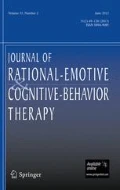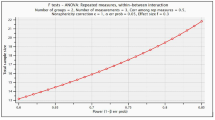Abstract
This study assessed the efficacy of a CBT-based program in the reduction of undergraduate students’ academic procrastination behaviors. Pre-test post-test randomized control trial experimental design was adopted by the researchers for the study. Sixty-four (64) physics, chemistry and mathematics education undergraduate students who were drawn through proportionate stratified random sampling technique constituted the sample for the study. The students were randomly assigned to experimental (34) and control (30) groups. Procrastination Assessment Scale for Students (PASS) Academic Procrastination Behavior Scale (APBS) were used for data collection. PASS and APBS were properly validated by experts in test development and the internal consistency reliability indices of the items estimated as 0.78 and 0.83 respectively using Cronbach Alpha method. Before the commencement of the testing and treatment package, the researchers assured the participants of confidentiality of interactions and personal information as they work together in self-disclosure. Thereafter, pre-treatment assessment (pre-test) was conducted using the PASS and APBS in order to collect baseline data (Time 1). After that, the experimental group was exposed to 90 min of the CBT program twice a week for a period of 6-weeks. The treatment took place between September and November 2018. Post-test (Time 2) assessment was conducted 1 week after the last treatment session. Besides, a follow-up assessment was conducted after 2 months of the treatment (Time 3). Data collected were analyzed using repeated-measures analysis of variance. The findings of the study revealed that: the efficacy of cognitive behavior therapy on the reduction of academic procrastination among physics, chemistry and mathematics undergraduate students, was significant at posttest and follow-up measures. One of the implications of the findings is that if undergraduate students are not properly counseled, their procrastination behaviors will continue to increase. Based on the findings, it was recommended among others that Federal government or relevant education authorities should provide enough guidance counselors in the various institutions of higher learning who will assist in the counseling of the students on the dangers of academic procrastination using CBT.

Similar content being viewed by others
References
Akbay, S. E., & Gizir, C. A. (2010). Cinsiyete göre üniversite öğrencilerinde akademik erteleme davranışı: akademik güdülenme, akademik özyeterlik ve akademik yükleme stillerinin rolü. Mersin Üniversitesi Eğitim Fakültesi Dergisi, 6(1), 60–78.
Akinsola, M. K., Tella, A., & Tella, A. (2007). Correlates of academic procrastination and mathematics achievement of university undergraduate students. Eurasia Journal of Mathematics, Science & Technology Education, 3(4), 363–370.
Antony, M. M., Purdon, C. L., Huta, V., & Swinson, R. P. (1998). Dimensions of perfectionism across the anxiety disorders. Behaviour Research and Therapy, 36(12), 1143–1154. https://doi.org/10.1016/S0005-7967(98)00083-7.
Balkıs, M., & Duru, E. (2007). The evaluation of the major characteristics and aspects of the procrastination in the framework of psychological counselingand guidance. Kuram ve Uygulamada Egitim Bilimleri, 7(1), 376.
Balkıs, M., & Duru, E. (2012). Başarısızlık korkusu-benlik değeri ilişkisinde benlik saygısı ve erteleme eğiliminin doğrudan ve dolaylı rolleri. International Journal of Human Sciences [Online], 9(2), 1075–1093.
Beck, C. T. (2001). Predictors of postpartum depression: An update. Nursing Research, 50(5), 275–285.
Binder, K. (2000). The effect of an academic procrastination treatment on student procrastination and subjective well-being (Master’s thesis, Carleton University). Retrieved February 20, 2018 from http://www.nlc-bnc.ca/obj/s4/f2/dsk2/ftp01/MQ57652.pdf.
Burka, J. B., & Yuen, L. M. (2008). Procrastination: Why you do it, what to do about it now?. Cambridge, MA: Da Capo Press.
Çakıcı, D. Ç. (2003). Lise ve üniversite öğrencilerinde genel erteleme ve akademik erteleme davranışının incelenmesi (Master’s thesis), Ankara University, Ankara, Turkey. Retrieved January 12, 2018 from https://tez.yok.gov.tr/UlusalTezMerkezi.
Cown, W. (Eds.). (n.d.) Procrastination and task avoidance: Theory, research and treatment (pp. 97–112). New York: Plenum.
Dewitte, S., & Schouwenburg, H. C. (2002). Procrastination, temptations, and incentives: The struggle between the present and the future in procrastinators and the punctual. European Journal of Personality, 16(6), 469–489.
Dryden, W. (2009). Rational emotive behavior therapy: Distinctive features. London: Routledge.
Elmer, D. (2000). Academic procrastination: Wasted time or informed delay? Research presented at Central States Communication Association Convention, Detroit, M1 in April 2000. Retrieved January 12, 2018 from www.Deniseelmer.htm.
Essau, C. A., Ederer, E. M., O’Callaghan, J., & Aschemann, B. (2008). Doing it now or later? Correlates, predictors and prevention of academic, decisional and general procrastination among students in Austria. A poster presentation at the presentation at the 8th Alps-Adria psychology conference, October 2–4, Ljubljana, Slovenia.
Faul, M., Wald, M. M., Rutland-Brown, W., Sullivent, E. E., & Sattin, R. W. (2007). Using a cost-benefit analysis to estimate outcomes of a clinical treatment guideline: testing the Brain Trauma Foundation guidelines for the treatment of severe traumatic brain injury. Journal of Trauma and Acute Care Surgery, 63(6), 1271–1278.
Fee, R. L., & Tangney, J. P. (2000). Procrastination: A means of avoiding shame or guilt? Journal of Social Behavior and Personality, 15(5), 167.
Ferrari, J. (2001). Procrastination as self-regulation failure of performance: Effects of cognitive load, self-awareness and time limits on ‘working best under pressure’. European Journal of Personality, 15, 391–406.
Ferrari, J. (2018). Delaying disposing: Examining the relationship between procrastination and clutter across generations. Current Psychology, 37(2), 426–431. https://doi.org/10.1007/s12144-017-9679-4.
Ferrari, J. R., Johnson, J. L., & McCown, W. G. (1995). Procrastination research (pp. 21–46). New York: Springer. https://doi.org/10.1007/978-1-4899-0227-6_2.
Ferrari, J. R., & Pychyl, T. A. (Eds.). (2000). Procrastination: Current Issues and New Directions. Select Press.
Gallagher, S. A., Stepien, W. J., & Rosenthal, H. (1992). The effects of problem-based learning on problem solving. Gifted Child Quarterly, 36(4), 195–200.
Glick, D. M., Millstein, D. J., & Orsillo, S. M. (2014). A preliminary investigation of the role of psychological inflexibility in academic procrastination. Journal of Contextual Behavioral Science, 3(2), 81–88.
Goode, C. (20081). Effects of academic procrastination: Students procrastination affects more than grades. Retrieved October 13, 2008, from http://homeworktree.com/media/news-releases/academic-procrastination.
Horebeek, W. V., Michielsen, S., Neyskens, A., & Depreeuw, E. (2004). A cognitive-behavioral approach in group treatment of procrastinators in an academic setting.
Kağan, M. (2010). Akılcı duygusal-davranışsal yaklaşıma dayalı akademik erteleme davranışını önleme programının etkililiğinin değerlendirilmesi (Doctoral dissertation, Ankara University, Ankara, Turkey). Retrieved March 3, 2018 from https://tez.yok.gov.tr/UlusalTezMerkezi.
Kandemir, M. (2010). Akademik erteleme davranışını açıklayıcı bir model (Doctoral dissertation, Gazi University, Ankara, Turkey). Retrieved February 27, 2018 from https://tez.yok.gov.tr/UlusalTezMerkezi.
Kirst-Ashman, K. K., & Hull, G. H., Jr. (2016). Empowerment series: Generalist practice with organizations and communities. Cengage Learning, 67. ISBN 978-1-305-94329-2.
Kliener, K. (n.d.) When Manama is too soon. Retrieved from www.thestar.com.
Knaus, W. (2010). End procrastination now! Get it done with a proven psychological approach. New York, NY: McCraw Hill.
Kutlesa, N. (1998). Effect of group counseling with university students who complain of procrastination (Master’s thesis, University of Western Ontario, London). Retrieved January 7, 2018 from http://www.collectionscanada.gc.ca/obj/s4/f2/dsk2/ftp01/ MQ30727.pdf.
Laziness: Fact or Fiction? Retrieved 23 November 2016.
Lay, C. H. (1986). At last, my research article on procrastination. Journal of Research in Personality, 20(4), 474–495.
Lay, C. (1995). Trait procrastination, agitation, dejection and self-discrepency. Journal of College Student Development, 33, 301–309.
Lee, E. (2005). The relationship of motivation and flow experience to academic procrastination in university students. The Journal of Genetic Psychology, 166(1), 5–14.
Milgram, N., Marshevsky, S., & Sadeh, C. (1995). Correlates of academic procrastination: Discomfort, task aversiveness, and task capability. The Journal of psychology, 129(2), 145–155.
Neenan, M. (2008). Tackling procrastination: A REBT perspective for coaches. Journal of Rational-Emotive Behavioural Therapy, 26, 53–62. https://doi.org/10.1007/s10942-007-0074-1.
Onwuegbuzie, A. (2004). Academic procrastination and statistics anxiety: Assessment and evaluation in higher education (Vol. 29, No. 1). Retrieved April 5, 2018 from www.inform.a.world.com/smpp/content~content.
Ossebaard, M. E., Oost, H. A., Van den Heuvel, S., & Ossebaard, C. A. (2014). The effect of a positive psychological intervention on academic procrastination. Retrieved April 5, 2018 from http://www.i2l.nl/pdf/4ArticleMHS.pdf.
Özer, A., & Altun, E. (2011). Üniversite öğrencilerinin akademik erteleme nedenleri. Mehmet Akif Ersoy Üniversitesi Eğitim Fakültesi Dergisi, 11(21), 45–72.
Pychyl, T. (2008). Worry helps me cope: A metacognitive belief linked to procrastination. Carleton University Ottawa, Canada. Retrieved April 5, 2018 from www.psychology.todayblogs.htm.
Pychyl, T. A., & Binder, K. (2004). A project-analytic perspective on academic procrastination and intervention.
Pychyl, T. A., & Flett, G. L. (2012). Procrastination and self-regulatory failure: An introduction to the special issue. Journal of Rational-Emotive & Cognitive-Behavior Therapy, 30(4), 203–212. https://doi.org/10.1007/s10942-012-0149-5.
Pychyl, T. A., Lee, J. M., Thibodeau, R., & Blunt, A. (2000). Five days of emotion: An experience sampling study of undergraduate student procrastination. Journal of Social Behavior and Personality, 15(5), 239.
Rivait, L. (2007). What I don’t do in my summer vacations: Fighting procrastination. Retrieved December 21, 2009, from http://www.past.thepages.ca/feature.htm.
Rozental, A., & Carlbring, P. (2013). Internet-based cognitive behavior therapy for procrastination: Study protocol for a randomized controlled trial. JMIR Research Protocols, 2(2), e46. https://doi.org/10.2196/resprot.2801.
Rozental, A., Forsström, D., Nilsson, S., Rizzo, A., & Carlbring, P. (2014). Group versus Internet-based cognitive-behavioral therapy for procrastination: Study protocol for a randomized controlled trial. Internet Interventions, 1(2), 84–89. https://doi.org/10.1016/j.invent.2014.05.005.
Schraw, G., Wadkins, T., & Olafson, L. (2007). Doing the things we do: A grounded theory of academic procrastination. Journal of Educational Psychology, 99, 12–25.
Schubert, W., Lilly, J., Donald, W., & Stewart, D. W. (2000). Overcoming the powerlessness of procrastination. Guidance and Counseling, 16(1), 39–43.
Shah, A. S. (2000). Exploring the world of English: A practical course in composition. Lahore: Markazi Kutub Khana.
Sirois, F. M. (2014). Procrastination and stress: Exploring the role of self-compassion. Self and Identity, 13(2), 128–145. https://doi.org/10.1080/15298868.2013.763404.
Stead, R., Shanahan, M. J., & Neufeld, R. W. J. (2010). I’ll go to therapy, eventually: Procrastination, stress and mental health. Personality and Individual Differences, 49, 175–180.
Steel, P. (2007). The nature of procrastination: A meta-analytic and theoretical review of quintessential self-regulatory failure. Psychological Bulletin, 133(1), 65–94. https://doi.org/10.1037/0033-2909.133.1.65.
Steel, P. (2008). Procrastination history. Retrieved January 12, 2018 from www.procrastinus-history.htm.
Stöber, J., & Joormann, J. (2001). Worry, procrastination, and perfectionism: Differentiating amount of worry, pathological worry, anxiety, and depression. Cognitive Therapy and Research, 25(1), 49–60. https://doi.org/10.1023/A:1026474715384.
Tice, D. M., & Baumeister, R. F. (1997). Longitudinal study of procrastination, performance, stress, and health: The costs and benefits of dawdling. Psychological Science, 8, 454–458.
Toker, B., & Avcı, R. (2015). Effect of cognitive-behavioral-theory-based skill training on academic procrastination behaviors of university students. Educational Sciences: Theory & Practice, 15(5), 1157–1168.
Uzun, B. (2005). Academic procrastination: Prevalence, self-reported reasons, gender difference and it’s relation with academic achievement (Master’s thesis, Middle East Technical University, Ankara, Turkey). Retrieved January 12, 2018 from https://tez.yok.gov.tr/UlusalTezMerkezi.
Uzun, B. (2010). A path analytic model of procrastination: Testing cognitive, affective and behavioral model (Doctoral dissertation, Middle East Technical University, Ankara, Turkey). Retrieved January 12, 2018 from https://tez.yok.gov.tr/UlusalTezMerkezi.
Uzun, B., Demir, A., & Ferrari, J. A. (2013). Reducing academic procrastination through a group treatment program: A pilot study. Journal of Rational-Emotive & Cognitive-Behavior Therapy, 31, 127–135. https://doi.org/10.1007/s10942-013-0165-0.
Williams, J. G., Stark, S. K., & Foster, E. E. (2008). Start today or the very last day? The relationships among self-compassion, motivation, and procrastination. American Journal of Psychological Research.
Author information
Authors and Affiliations
Corresponding author
Ethics declarations
Conflict of interest
The authors declare that they have no conflict of interest.
Ethical Approval
Faculty of Education Ethical Committee on research at the University of Nigeria, Nsukka, Nigeria (REC/FOE/18/00081) granted approval to conduct this study. The authors adhered to the ethical standard specification of the American Psychological Association APA (2017), and with that of the World Medical Association (2013).
Additional information
Publisher's Note
Springer Nature remains neutral with regard to jurisdictional claims in published maps and institutional affiliations.
Rights and permissions
About this article
Cite this article
Ugwuanyi, C.S., Gana, C.S., Ugwuanyi, C.C. et al. Efficacy of Cognitive Behaviour Therapy on Academic Procrastination Behaviours Among Students Enrolled in Physics, Chemistry and Mathematics Education (PCME). J Rat-Emo Cognitive-Behav Ther 38, 522–539 (2020). https://doi.org/10.1007/s10942-020-00350-7
Published:
Issue Date:
DOI: https://doi.org/10.1007/s10942-020-00350-7




